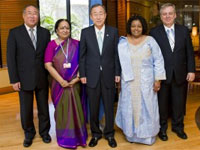
Top stories


ESG & Sustainability#BudgetSpeech2026: SRD grant unchanged, other Sassa social grants see hike
11 hours



More news












ESG & Sustainability
South Africa’s carbon tax should stay: climate scientists explain why










Representing Brazil, SA, India and China; Xie Zhenhua, vice chairman of the National Development and Reform Commission of China; Edna Molewa, minister of Water and Environmental Affairs of South Africa; T.S. Tirumurti, joint secretary, Ministry of External Affairs of India; and Ambassador Andre Correa do Lago, director of the Department of the Environment and Special Affairs, Ministry of Foreign Affairs of Brazil, participated in the meeting.
Summary of outcomes: the ministers:
The ministers welcomed the offer by Brazil to host the 16th BASIC Ministerial Meeting in September 2013.
Download the full joint statement issued at the conclusion of the 15th BASIC Ministerial Meeting on Climate Change.